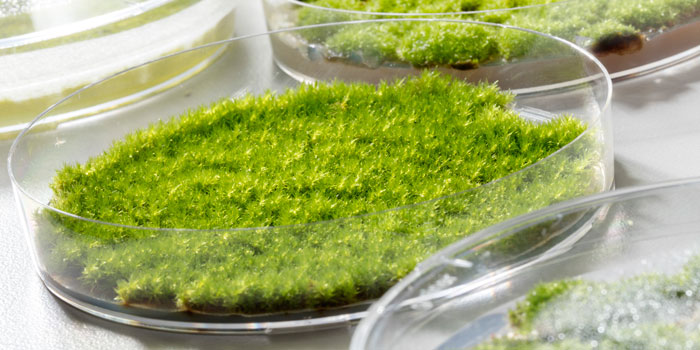Associate Professor Henrik Toft Simonsen from
DTU Bioengineering hosted a reception for his company—
Mosspiration Biotech—which has got off to a good start selling its scent-producing mosses.
Everywhere we look on the lab tables we find petri dishes and test tubes with liquid green moss cultures. Guests swarm around and open the small containers to guess what plant has supplied the scent genes for the different samples. A couple of cinema tickets are on offer to the sharpest nose, which turns out to belong to one of the department’s students.
The fragrance is delicate, but not overpowering; the volatile substances evaporate each time the lid is lifted off the liquid culture. But no matter—this is not how the moss is to be sold.
The product Orbella (the beautiful ball) comes as an assembly set consisting of a round, open glass container, a cotton bag with white stones, and a petri dish with a nutritious jelly and a pad of moss. The stones must be soaked and mixed with the jelly, placed in the round glass container, and finally the soaked moss pad is placed on the stones where it continues to grow, emitting pleasant fragrances provided it receives water and a little fertilizer.
If you want to own such a fragrancer that lives on sunlight, CO2, and water and does not contain harmful chemical compounds, then you should not live in Denmark—or any other European country for that matter. The moss is genetically modified, and GM plants have a hard time securing approval in our part of the world, even though Henrik Toft Simonsen can guarantee that his moss is non-toxic and does not contain pathogenic organisms. The moss cells have simply been impregnated with scent genes from pine, lemons, and other fragrant herbs.
“Our product is selling well in the USA and we’re now trying to conduct environmental research so we can get permits from the Asian and Latin American countries—but I don't think we’ll ever get European approval. We simply don’t have the energy to go through the extremely lengthy political process which NGO hearings and approvals in EU and national parliaments demand. It’s easier in the USA, where you ‘only’ have to prove that the product can’t damage agriculture,” he says.

Ongoing DTU research
Nevertheless, Henrik predicts that as early as next year, Mosspiration may outgrow the small laboratory it leases from DTU and hire a CEO—as he has no plans to relinquish his professorship at DTU. He loves researching green cells and generating new ideas for how they can be used far too much for that to happen.
Henrik is currently working on a number of research projects, which will hopefully result in faster lead times and more streamlined cell factories. Orbella is Mosspiration’s first product, but certainly not the last. Henrik, his employee Hansol Bae, and the many students who carry out projects in the company, are fully engaged in also getting the moss to produce essential oils and substances that may be included in medicinal preparations. And who knows—maybe they can even make it glow in the dark or tomato red? The sky is the limit.